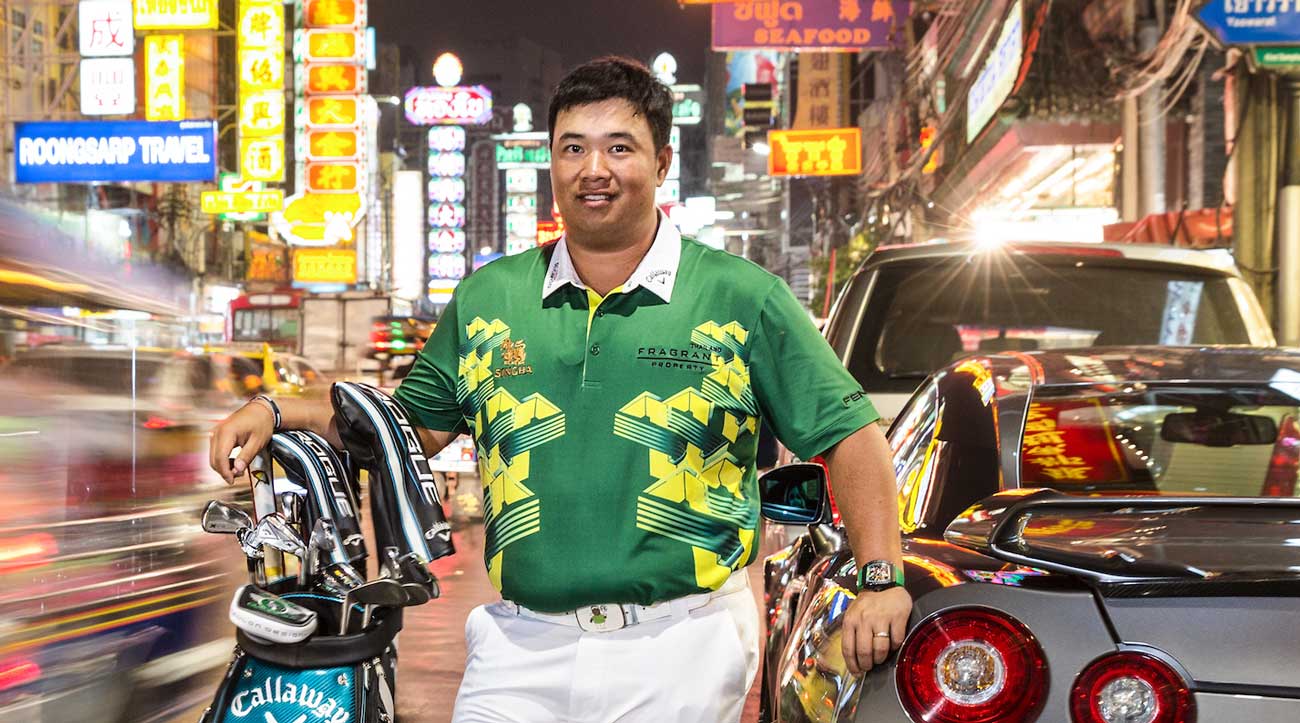“Pressure,” Kiradech Aphibarnrat says, hammering the gas pedal of his orange Lamborghini Aventador, “is when you book a $150,000 car but you only have $15,000 in the bank.” We are roaring around the boulevards of Bangkok, where the rules of the road are treated as mere suggestions. Riding with Aphibarnrat is like living in a slightly terrifying video game, as he weaves in and out of traffic and, whenever open road presents itself, races to 110 miles per hour — enough force to pin his utterly helpless passenger to the seat.
The Lambo cost considerably more than a buck-fifty; over the howl of the 12-cylinder engine, Aphibarnrat, 28, was reflecting on the first flashy car he ever bought, a Mercedes coupe, back when he was 19 years old and just embarking on a pro career. Thailand is a matriarchal society, and Aphibarnrat is a little bit of a mama’s boy, so his mother, Supunnikar, has always been heavily involved in his finances. She was not pleased with the teenager’s extravagant purchase and gave him 90 days to make $150,000 on the golf course, otherwise the Benz was getting sold off.
“It made me play better,” Aphibarnrat says, taking a vape while adjusting the volume on the American hip-hop pouring out of the speakers. “I need goals, I need something to chase after.” With a smirk, he adds, “I made the money, I kept the car.”
It is a parable for the modern age.
Guys, I hate to be a tease because the story won’t appear in Golf Mag for a little while, but I’m cruising around with Barn Rat. In his orange Lambo. In Bangkok. (Alas, I didn’t get video of him weaving through traffic at 200 kms. per hour because I was too busy soiling myself.) pic.twitter.com/fv31bbVFaF
— Alan Shipnuck (@AlanShipnuck) April 18, 2018
The Lamborghini is not even Aphibarnrat’s favorite ride; he’s partial to his Nissan GT-R because he can actually fit a golf bag in the trunk, and it’s smoother to drive, even though aftermarket adjustments have boosted its horsepower to nearly 900. Which clearly is not enough, because he is currently building from the ground up a street-legal tuner that will have 1,600 horsepower, plus two tanks of nitrous oxide — which will add another 300 or so ponies.
Aphibarnrat’s appetites are like his tee shots: prodigious. He has more fancy watches than he can count, including a jewel-encrusted Richard Mille valued at $1.5 million. (It was a gift from the royal family of Brunei after Aphibarnrat flew there straight from this year’s WGC in Mexico City and won a podunk Asian Development Tour event hosted by one of the princes.) But seemingly every pro golfer has a handful of luxe timepieces; more revealing is Aphibarnrat’s obsession with Yeezys, the limited edition Adidas sneakers designed by rap god Kanye West. In hip-hop culture, NBA locker rooms and even the most stylish spots in the 1st Arrondissement, Yeezys are the ultimate status symbol. How coveted are these kicks? At the Olympics in Rio, thieves broke into Aphibarnrat’s locker. They left behind his wallet, laptop computer and $25,000 TrackMan. They took the Yeezys.
Aphibarnrat has paid five-figures for a few of his favorite pairs, which still have their tags on because he’s afraid to actually wear them. In the master bedroom of his big house on the outskirts of Bangkok, featuring a decor that can only be described as Thai kitsch, dozens of pairs of Yeezys are lined up on the floor. Aphibarnrat recently took possession of a fancy downtown condominium, and to hear him tell it the condo will serve as a glorified storage unit: “I need somewhere to hide my shoes so my wife doesn’t know about them,” he says with a laugh. (It’s doubtful his bride, Tunyatorn, will be fooled; she has a Master’s degree from the University of Brighton and currently teaches an MBA course at Bangkok University.) While the conspicuous consumption of Tour pros can be off-putting and a little gross — if Ian Poulter never tweets again about his fleet of Ferraris it will be too soon — Aphibarnrat’s blingy lifestyle has added to his widespread appeal, because he’s clearly just a big kid living every adolescent boy’s dream.
“There is a cheekiness to it, so he gets away with it,” says his swing coach Mike Walker. “With some people the flash is ego-based, and they want to show off to make other people feel lesser. With Kiradech, you can see how much he enjoys his toys, so you have to smile about it.”
Even Aphibarnrat’s jiggly body feeds into the cult of personality: While his gym-toned colleagues are killjoys who live like monks, he has endeared himself to couch potatoes by not trying to disguise his love of noshing. Between the ropes he is constantly vaping, and Twitter blows up every time the cameras capture his billowing clouds of smoke. To his many electronic fanboys he is known simply as Barn Rat. With his girth, nicotine habit and booming tee shots, he has been pegged in some quarters as “the John Daly of Asia.” Thankfully, Barn Rat has none of Long John’s demons. Daly won only five times in a quarter century on the PGA Tour. Yes, two of them were majors, but he will always be a cautionary tale of squandered talent. Clearly, Barn Rat has his fun, but he honors his gift with hard work and dedication to his craft. He has already won once on the Asian Tour and four times on the European Tour. In April he reached 29th in the World Ranking; among male Thai golfers only Aphibarnrat’s mentor, Thongchai Jaidee, has ever climbed higher, reaching 27th in 2015. Along the way, Barn Rat has become that rarest of players, one universally beloved by fans, reporters and his colleagues.
“What a fun character he is,” says Adam Scott. “He’s the nicest person you’re ever going to meet, and he has one of my favorite swings on Tour. It’s great that the larger golf world is starting to recognize him.”
Back in the Lambo, Barn Rat is asked to explain his exploding popularity. “I don’t really know,” he says with a boyish giggle. “I’m just trying to be me.”
Quite clearly, that’s enough.
——————–
Aphibarnrat had a privileged childhood. His father, Panupong, owned an ice factory, which is a license to print money in tropical Thailand. His son recognized early on the symptoms of affluenza that afflicted the other children of the ruling class: “Life was too easy, so they didn’t have that drive to succeed. I didn’t want that to be me.”
Aphibarnrat threw himself into golf under the watchful gaze of his father, a mediocre but enthusiastic player, and he developed an action that is among the game’s most distinctive — as he’s dropping the club onto the ball his hands are so close to his body it looks like he’s swinging in a phone booth. It produces a lot of lag and thus compression of the ball, and it all goes back to his first boyhood lessons. “My teacher was always telling me to keep the right hand next to the body and just pull the butt of the grip down onto the ball,” he says. “To this day I still try to do that.” That swing coach, Chuchapasit Chokthanasart, imbued the young player with technical know-how, but it was his father who pushed him to excel. When Aphibarnrat was around 10 and already beginning to emerge as a force in junior tournaments, Panupong stepped away from day-to-day duties at his company to keep an eye on his son. “Every ball I ever hit, my dad was standing right next to me,” Aphibarnrat says. When he worked on his chipping and putting under the scorching sun, Panupong would hold an umbrella to provide shade.
Bankrolled by all that ice, Aphibarnrat competed in amateur tournaments across Asia, winning regularly. He proved himself on one of amateur golf’s grandest stages, the Junior Worlds, in San Diego, winning the 13/14-year-old division in 2003 and ’04. It was deeply meaningful to follow in the footsteps of his hero, Tiger Woods, the golfer formerly known as Eldrick Tont. In the U.S., Woods is often identified as African-American, but he is considered a blood brother in Thailand. “His mother is full Thai,” says Aphibarnrat. “That makes him one of us.”
When he was 15, Aphibarnrat’s idyllic life was torn asunder when the family business went bankrupt. In the son’s telling, he is to blame. “My dad left the company to help me with golf,” he says. “I feel like everything broke down because of me. We had to sell everything. It was a hard time.” Panupong is a taciturn man. He expresses no regret about his past priorities: “The boy comes before the business. Always.”
In the midst of this crisis, Aphibarnrat followed a cultural tradition and spent a week at a Buddhist temple. He shaved his head and eyebrows, fasted and, every day, prayed and meditated under the guidance of the monks. In Thailand, individuals and families routinely change their names in the hope of altering their luck, and so at the end of the week a ceremony was held. The teenager who arrived as Anujit Hirunratanakorn was rechristened Kiradech Aphibarnrat. Both names, he says, translate as “bright.” Eventually a guardian angel appeared in the guise of a golden dragon: the logo of Singha, the national beer of Thailand. Aphibarnrat landed a sponsorship deal and formally turned pro in 2008, at 18. He was determined to make it big — not for himself but for his parents. “They gave up everything for me, so now I have to take care of them,” he says. “I have to succeed. It’s all on me now.”
——————–
The Kiatthada Driving Range is a two-story, open-aired structure tucked into a quiet suburban neighborhood. The vibe was quite sleepy on a hot, humid Wednesday in mid-April: A handful of hackers made lazy swings, a couple of kids were goofing off, and a family of chickens pecked at the grass on the edge of the range. And then Barn Rat roared up in the GT-R. Suddenly the old ladies in the restaurant scurried to prepare his favorite dish (calamari and noodles in a yellow curry sauce that was to die for). The sleepy-eyed dude at the snack bar popped the top on Aphibarnrat’s preferred drink: grass jelly, the extract of a plant in the mint family that has a bitter taste and is as dark as an editor’s heart. The two kids — who, upon closer inspection, were wearing TEAM KIRADECH T-shirts — began peppering the range with smooth, learned swings, stealing glances at Aphibarnrat between shots. Here he’s not just a local hero, he’s the proprietor. This is the range where he took lessons starting at age 8, and he bought the place four years ago following the death of Chokthanasart, his lifelong instructor. He has decreed that the decor can never be changed — every poster, photo, mural and piece of furniture is to be left exactly as Chokthanasart wanted it. “I think of him every time I come here,” Aphibarnrat says. “Being here makes me feel close to him. It makes me remember all the things he taught me.”
With a chuckle, Aphibarnrat also allows that he bought the range to give his father something to do in retirement. Nearly every day, Panupong parks himself in a white plastic chair and offers nonstop commentary to the kids who are part of the junior program his son funds. Nursing an iced coffee and ever-present cigarette, methodically working his way through a huge bag of pork rinds, Panupong watched a young boy and his sister smack balls. He was asked how long the boy has been playing golf.
“A year and a half.”
He’s pretty darned good.
“No, he’s not,” Panupong said. “Nobody here is good enough.” Aphibarnrat smiled at his father’s brusque appraisal. “He’s tough because he cares,” he said.
Upstairs, Aphibarnrat has a studio where he always practices, tricked out with a Trackman and his own Callaway balls, on which he has drawn the Thai flag. Under Chokthanasart’s tutelage, it was here that he built the swing that carried him to the top spot on the Asian Tour’s Order of Merit in 2013, Barn Rat’s big breakthrough. The next year he lit out for the Euro Tour; he had been intimidated about playing overseas until he fell under the thrall of his countryman, Thonghai Jaidee, the former paratrooper who didn’t turn pro until he was 30 but would go on to win tournaments in Wales, Sweden, Germany and France. Jaidee helped ease Aphibarnrat’s culture shock.
“Thongchai played around the world and knew everything,” he says. “I’d land on a Monday and ask where are we eating tonight? He always says, ‘Thai food.’ I’m like, ‘Hey, we just came from Thailand, isn’t it better to have the local food?’ He just says, ‘Thai food is the best.’ I agree! So we always eat Thai food and he knows every place to go in every city.”
In 2015, the first season after Chokthanasart’s death, Aphibarnrat won twice on the European Tour. But in ’16 he made some swing changes on his own — “I tried to take the club back like Adam Scott” — and lost his way. Late in the year he began working with Mike Walker and his mentor Pete Cowen, who has ministered to most of the best players to come out of Europe over the last quarter century. “He has lots of idiosyncrasies, but they’re great,” says Walker. “All we’ve done is simplify things and get him back to being himself. He’s a shotmaker, just a phenomenally talented ballstriker.”
In January 2018, Aphibarnrat won a European Tour event in Australia, his first win on a major circuit in two and a half years. He’s been on a tear ever since, finishing tied for fifth at the WGC-Mexico City and making it to the quarterfinals of the WGC-Match Play, with Jon Rahm among his victims. At the Masters he was paired with Xander Schauffele, who said afterward, “What a talent. He can crush the ball.” But Schauffele was also impressed by the big man’s soft hands: “Some of the up-and-downs he pulled off were special.”
How good can Barn Rat be? “I’ll say this: Pete is not an easy man to impress, and even if he is impressed he very rarely shows it,” says Walker. “He’s worked with the best of the best, and I can tell you he rates Kiradech very highly. Reaching the top 10 [in the World Ranking] and staying there seems a very attainable goal.”
To realize his awesome potential, Aphibarnrat has begun working with a mental coach and, yes, a trainer. Over the last six months he has lost nearly 20 lbs., but he promises not to get too carried away: “I’m not trying to look like everyone else. I’m still going to have fun and go out with friends and eat my mom’s cooking.”
Supunnikar’s work in the kitchen is no joke — she used to run her own restaurant. The other day Barn Rat’s agent Win Inthara was at his man’s house tucking into a plate of leftovers and, between bites, he said, “Every time I come here I gain weight.” He didn’t seem to mind. Barn Rat’s parents live in his house, as does his sister, Sirinporn, 18. She is a competitive horse jumper, an expensive hobby her big brother happily supports. “Family is everything to me,” Aphibarnrat says. “Sure, I could put my parents and sister in their own houses, but I want them here, close to me. I want to see them every day.”
Aphibarnrat’s fine play at the start of 2018 earned him special temporary membership to the PGA Tour, allowing him to accept unlimited sponsor’s exemptions through the end of the season. Whether or not to decamp full-time for the U.S. is a weighty decision with which he continues to grapple. He loves the bright lights of the Tour, and the courses suit his bomb-and-gouge style. The warm embrace of the galleries leavens the sadness of being far away from his family. “The U.S. fans get me a little bit more,” he says. “On the European Tour the fans support the local guys more. The U.S. fans like to say my name and they seem to understand my personality.”
Even as he eyes property in Orlando, he is planning to buy up a couple of the neighboring houses in his Bangkok neighborhood and build a larger compound for his family. Of course, he has ulterior motives: “I need room for more cars.”
When Barn Rat goes out for a drive he always carries extra cash, should he get pulled over for speeding and need to pay on the spot what his friend Scott Hend calls “an administrative fee” to avoid getting a ticket. Aphibarnrat likes to drive fast because it forces him to concentrate on nothing but the road, and he’ll often cruise around for hours at a time when he needs to clear his mind. Back in the Lamborghini, there was a moment when we idled at a stop sign, as the Barn Rat tried to decide whether to go left or right. Finally he blasted off. I asked where we were going, and with a wolfish grin he said, “I don’t know, but we’re going to get there fast.”






